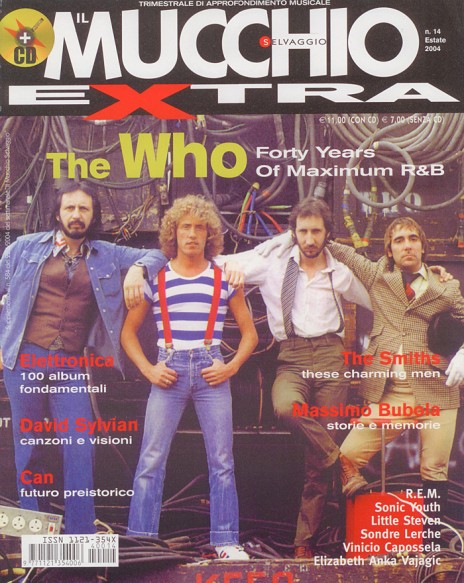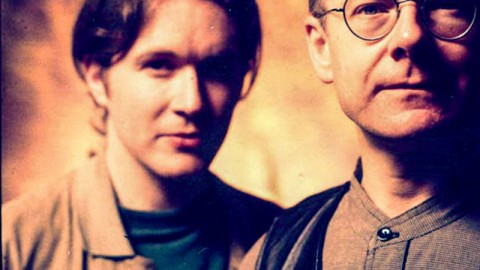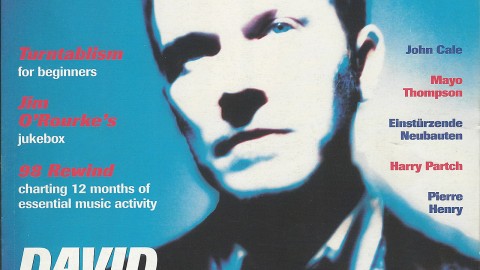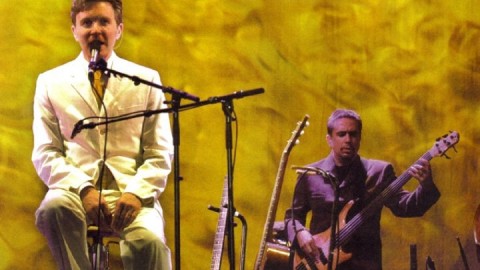
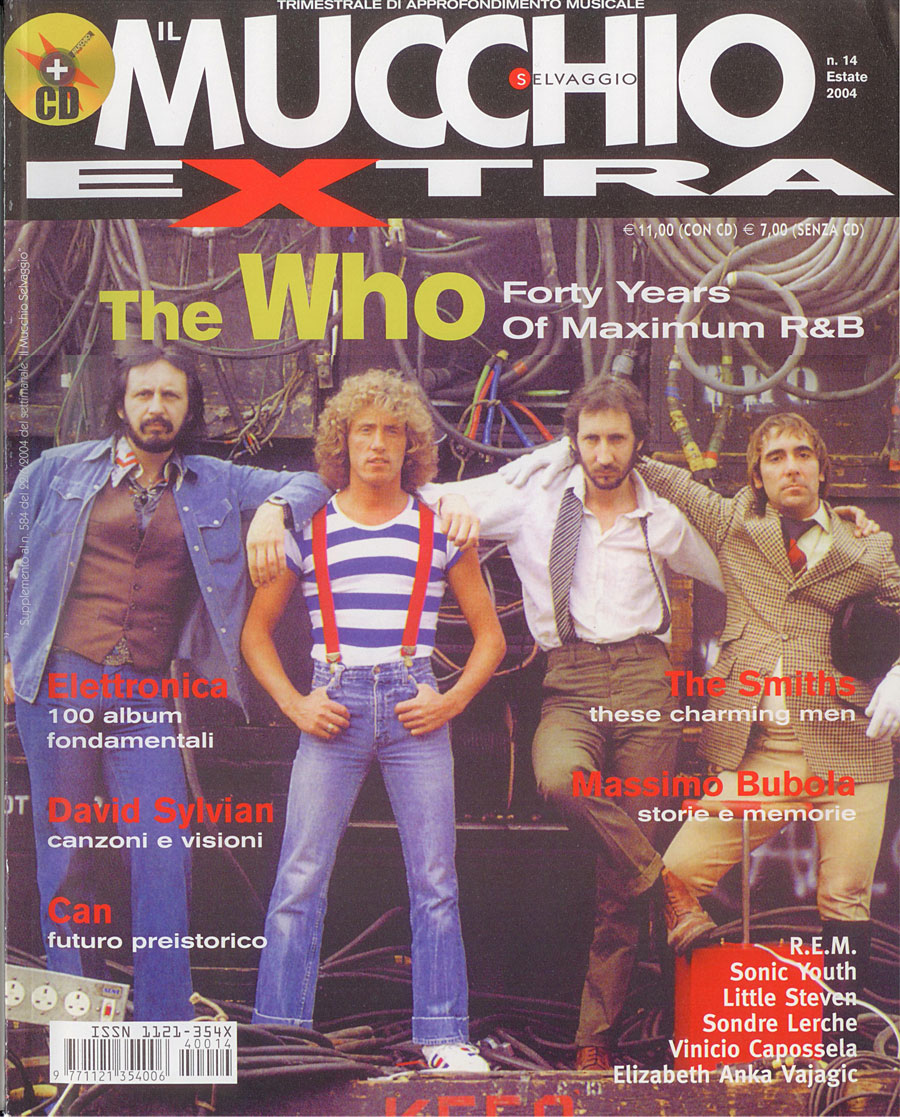

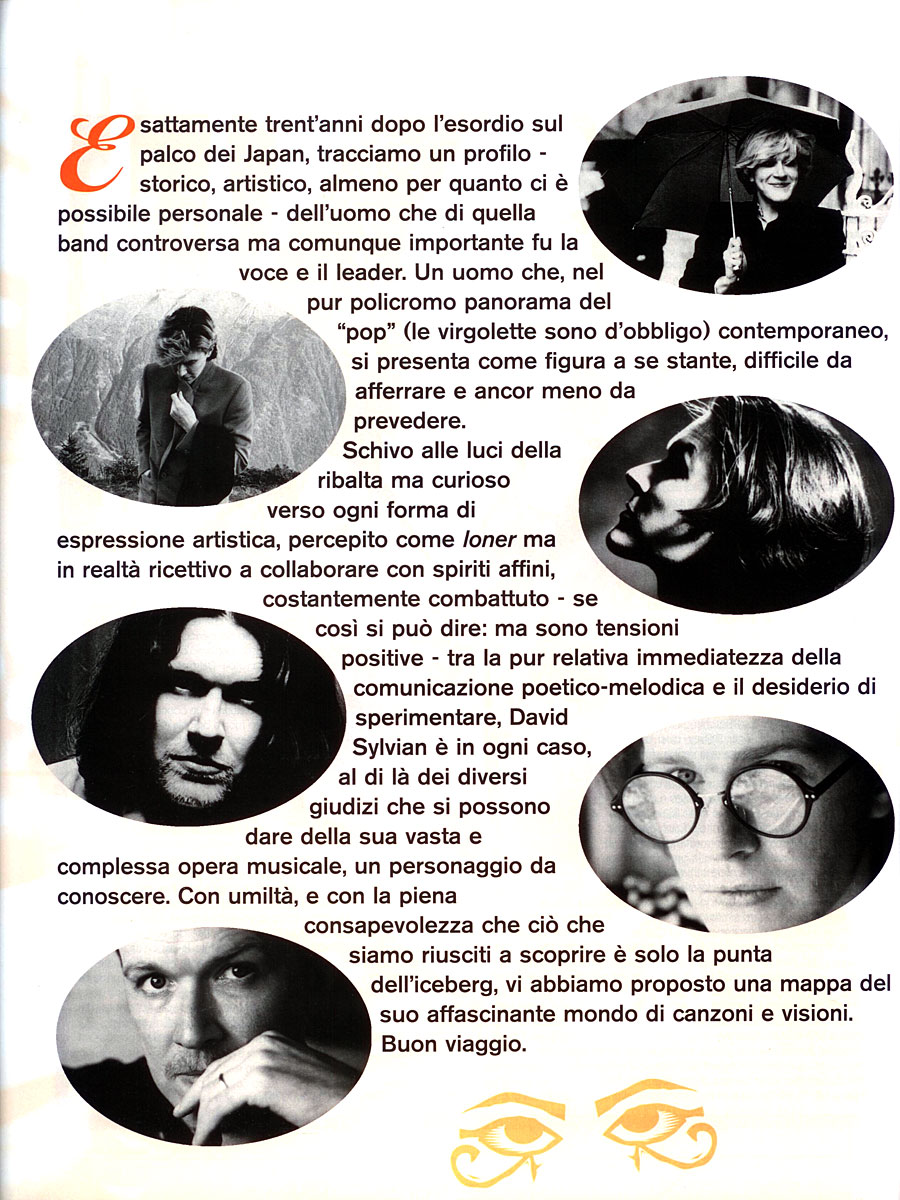

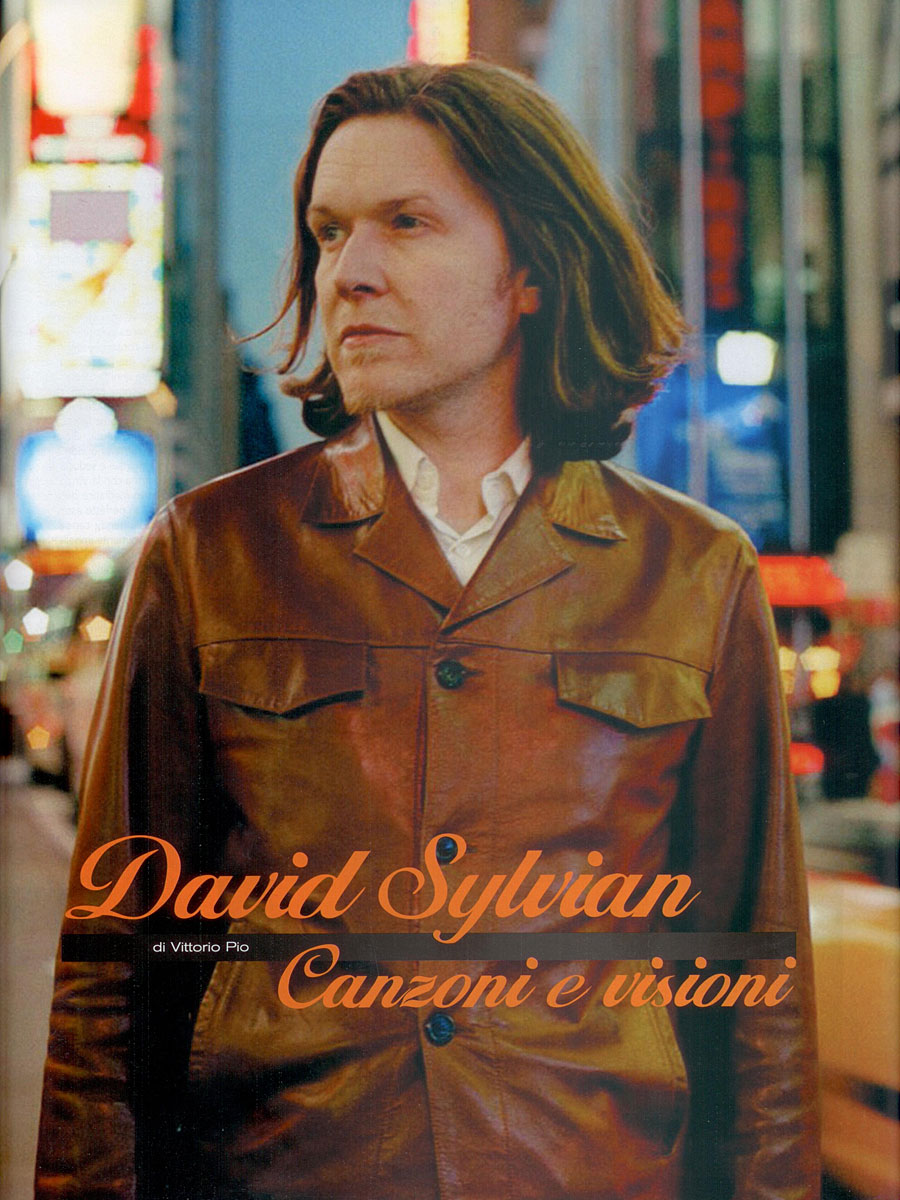

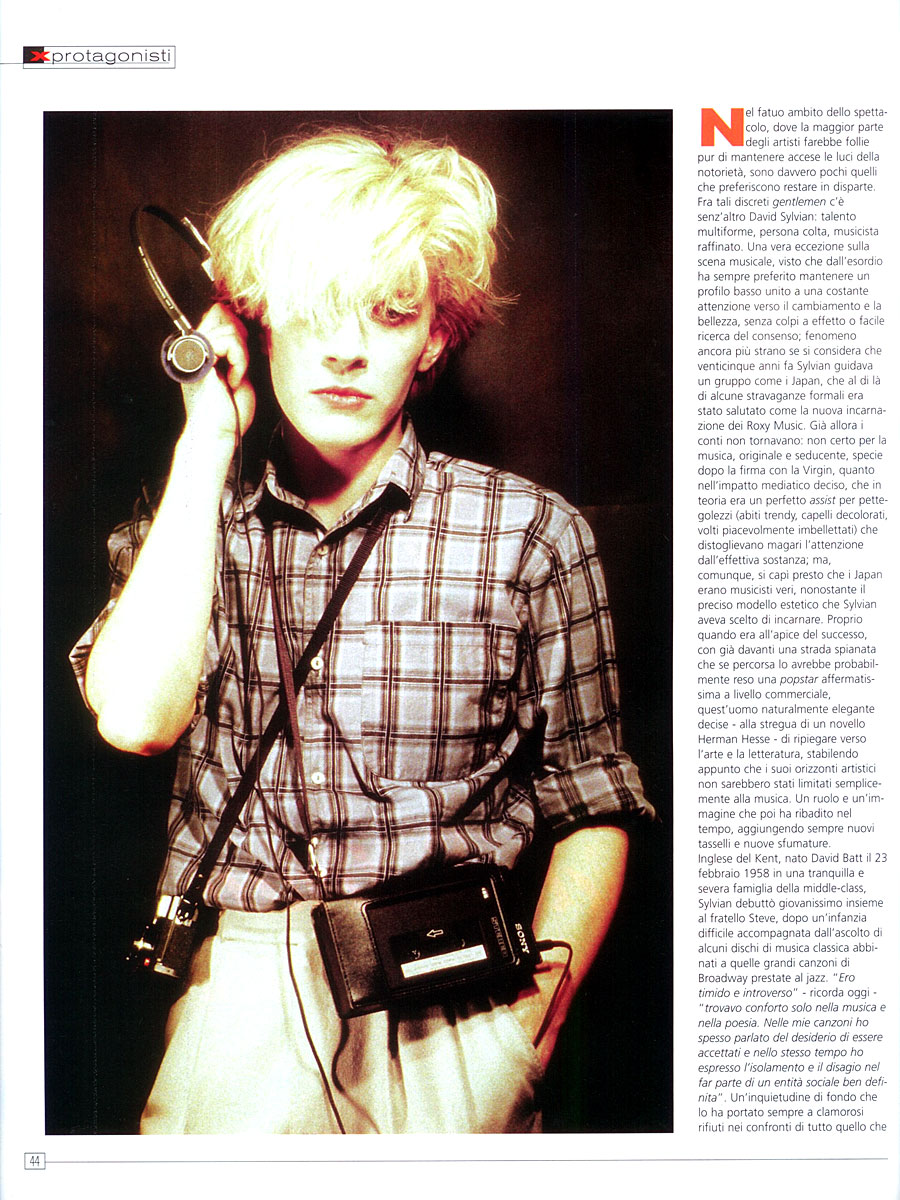

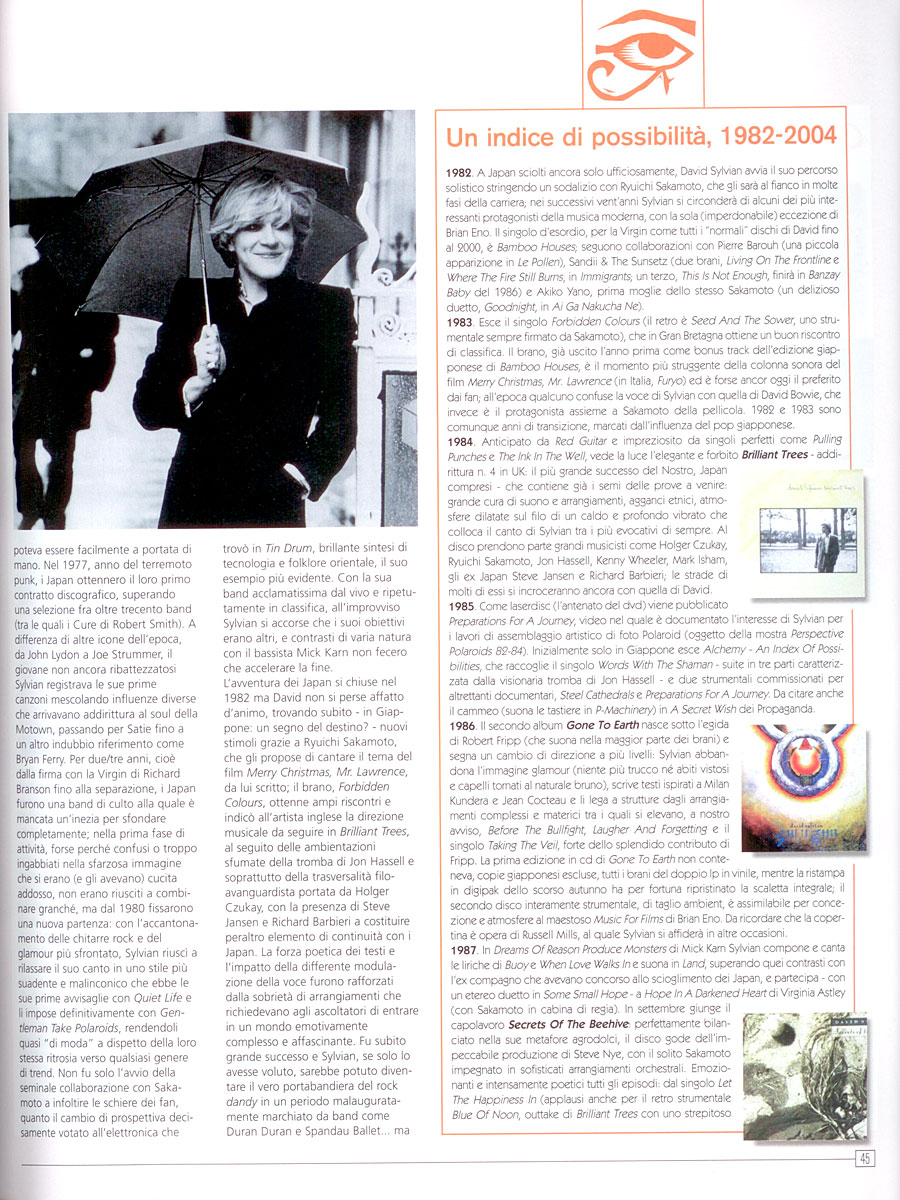

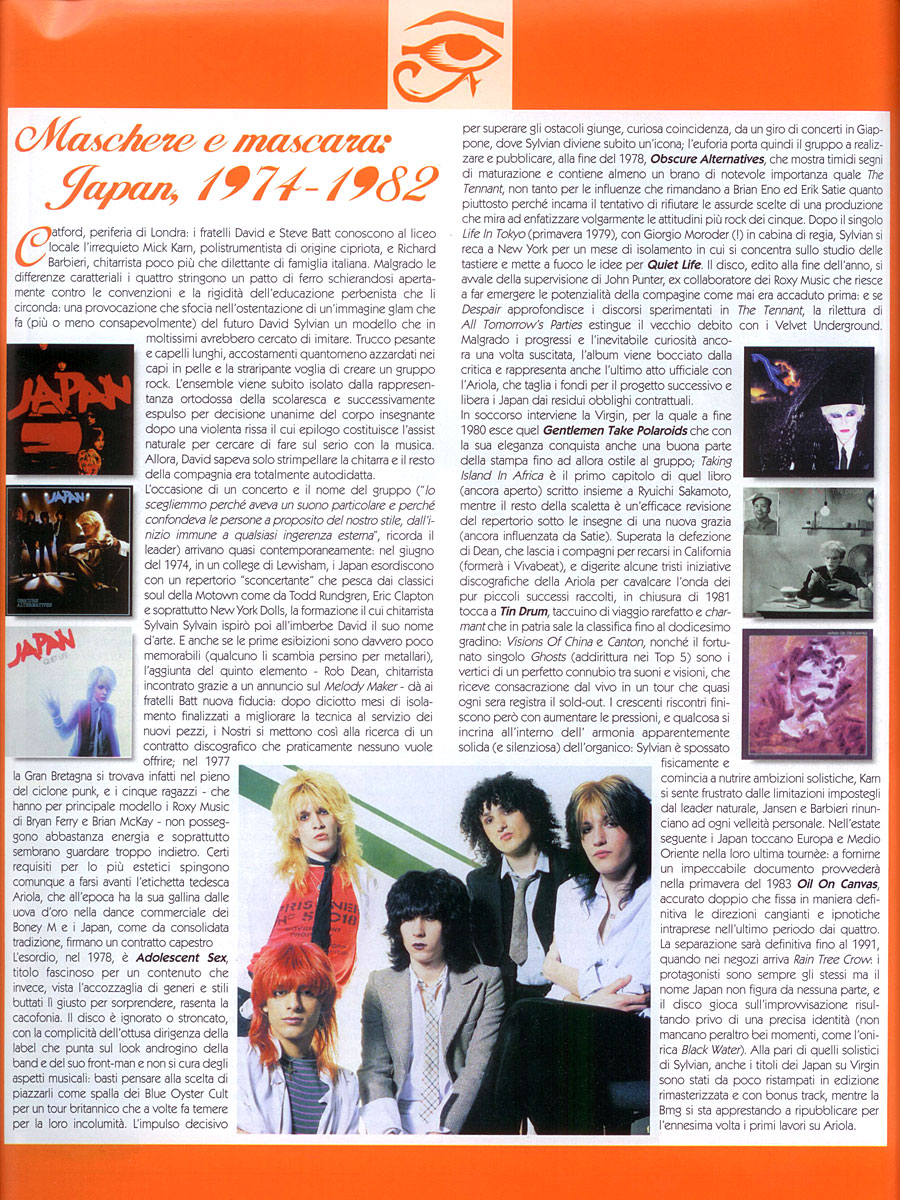

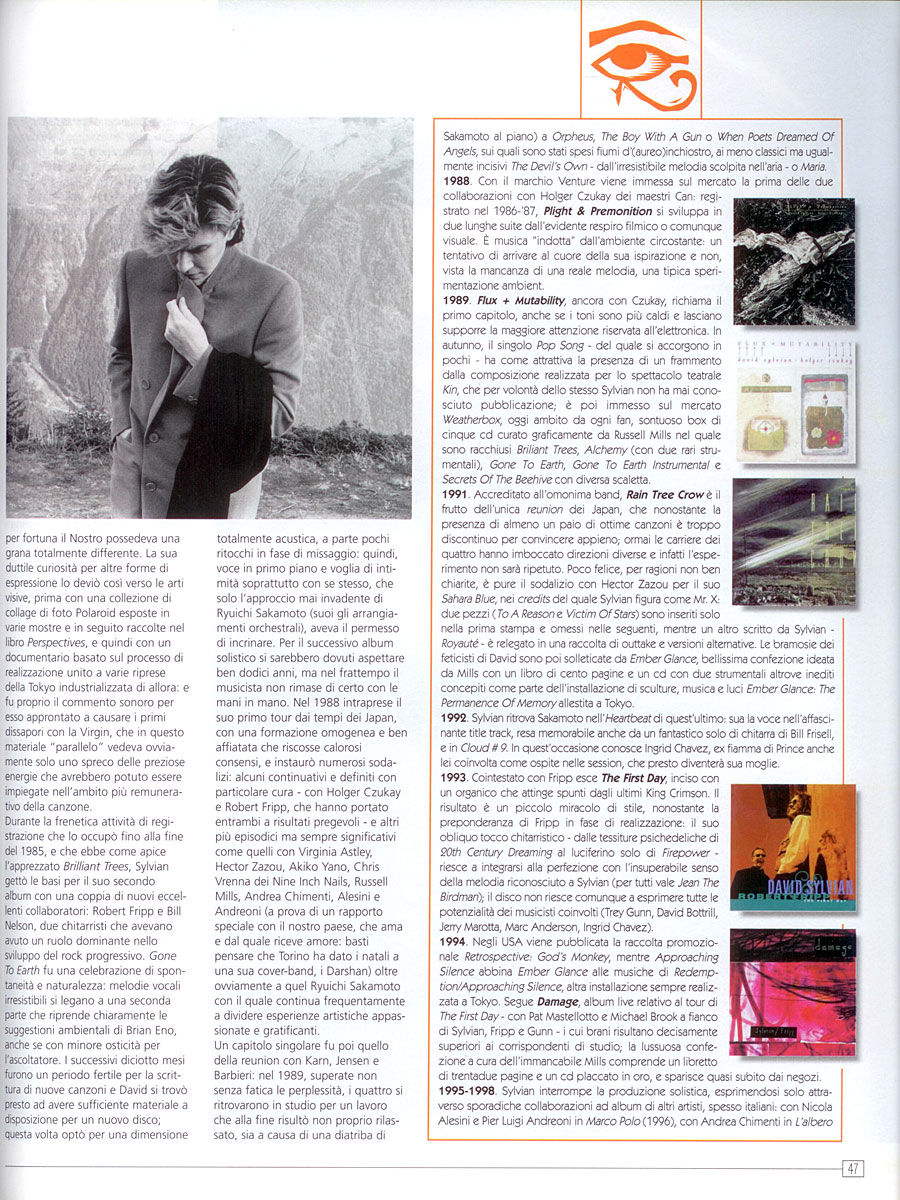

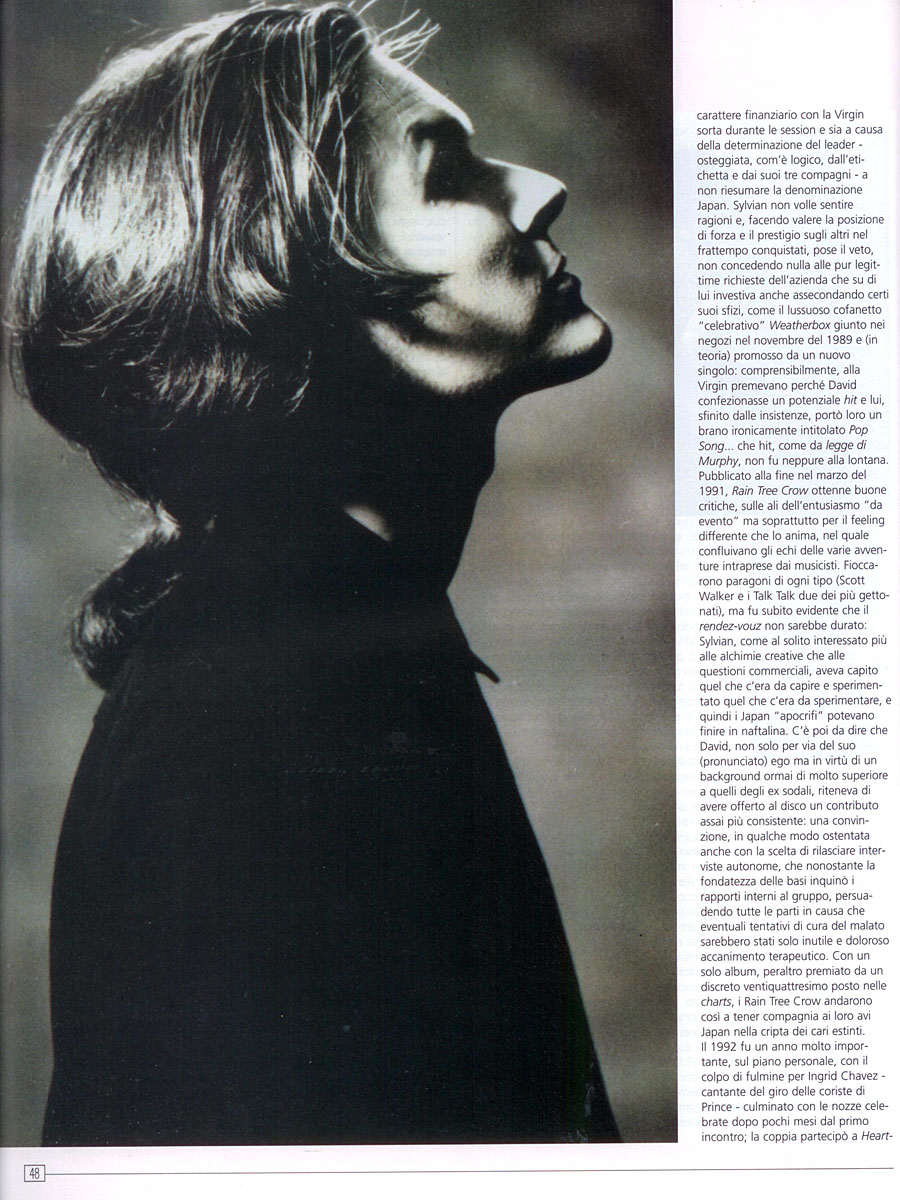

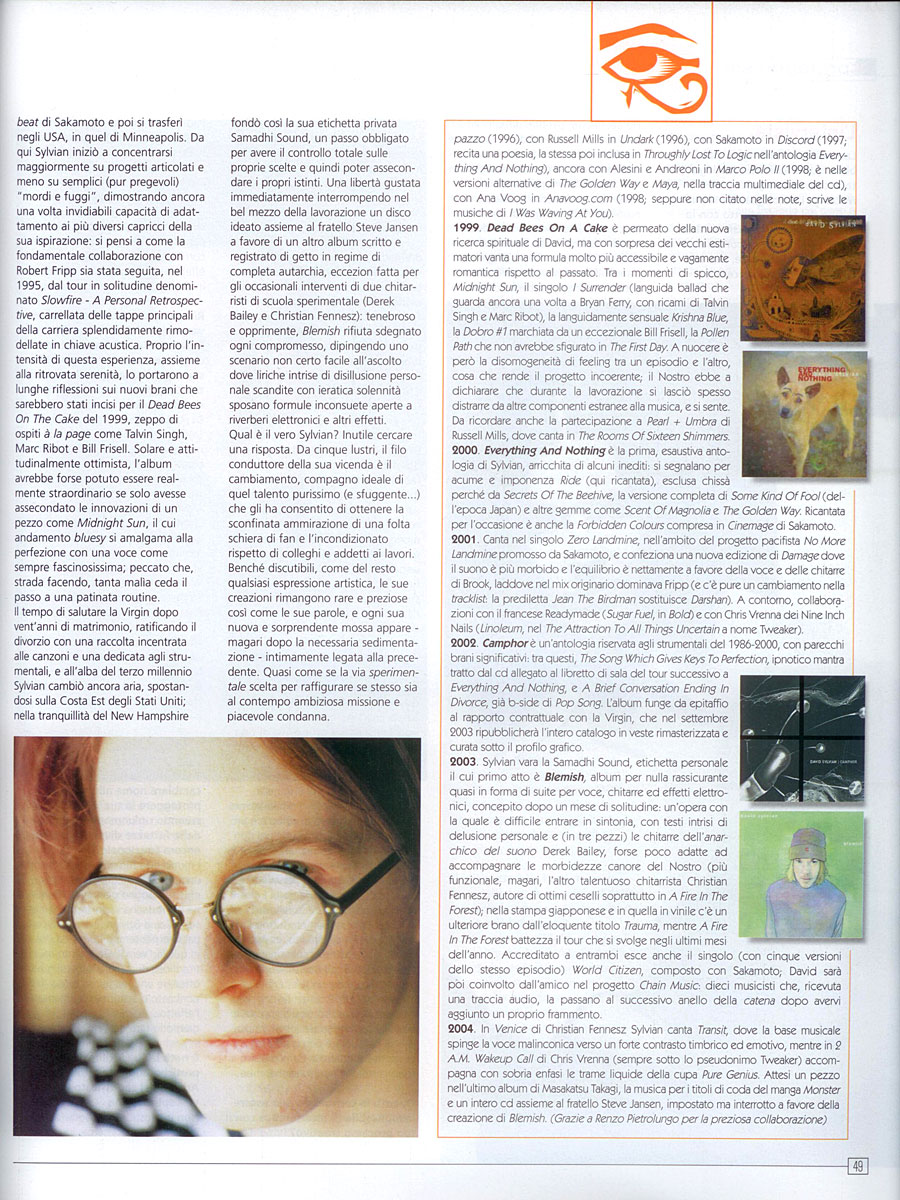

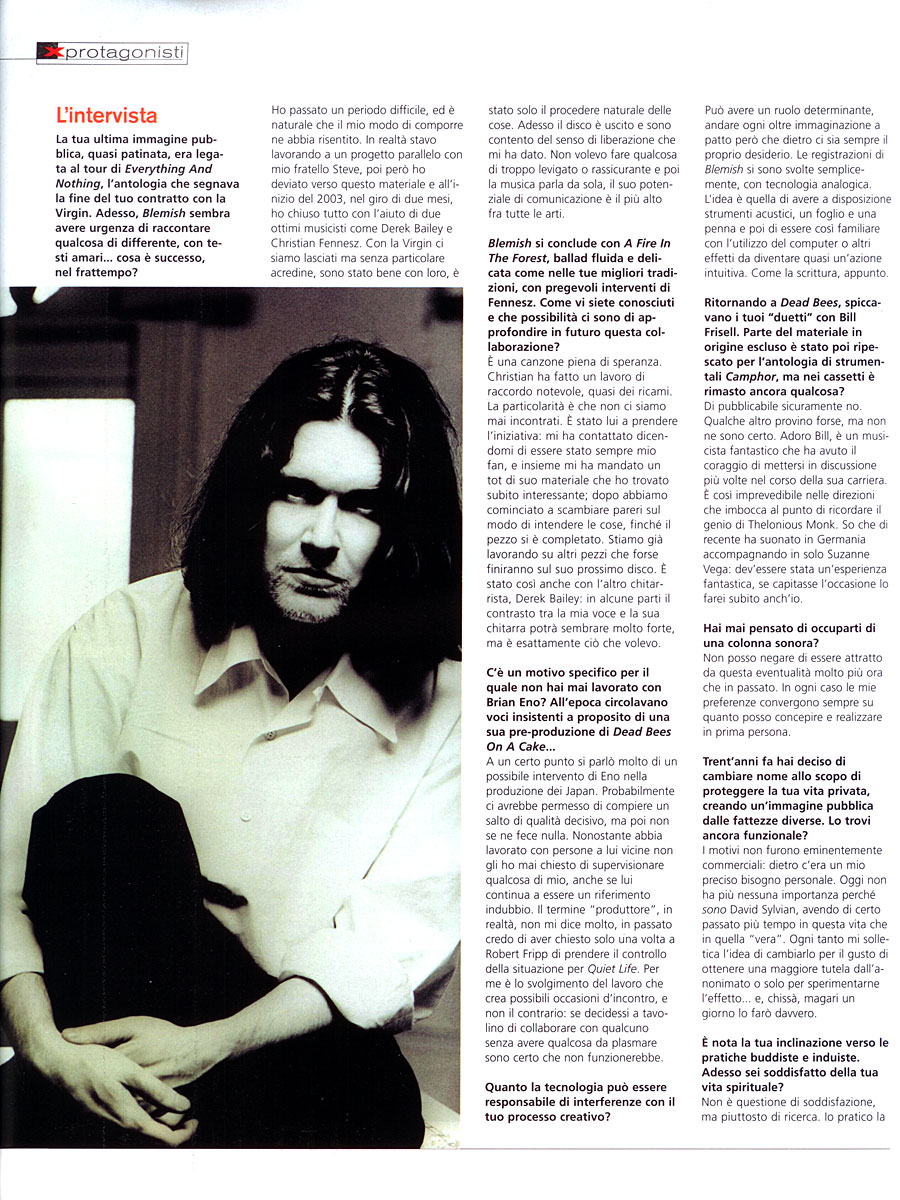

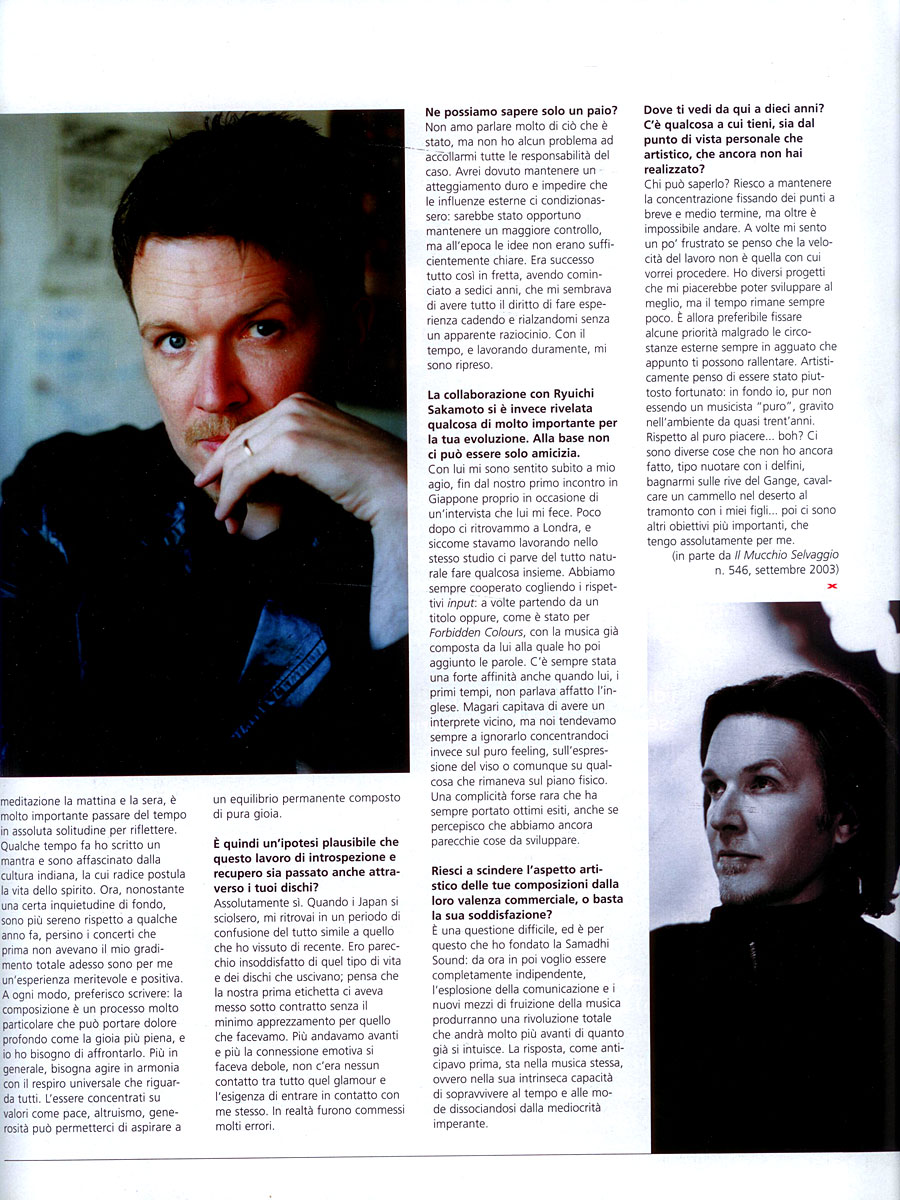
Vittorio Pio (Il Mucchio) interview 2003 Vittorio Pio & davidsylvian.net
The Italian journalist Vittorio Pio made an interview with David last 26 June 2003. A small part of this interview was used on KataWeb website (Read the publication here) and a longer 10-page verion was published in the September issue (#14 2004) of Il Mucchio Selvaggio (Italian music magazine).
Exclusive on davidsylvian.net this is the complete interview, published with kind permission of Vittorio Pio.
Initial transcript by Gerrit Hillebrand.
Completed and corrected by Clive Maidment.
Note that this interview was taken in June 2003, so long before the re-issues and the tour. Some questions seem to be unnecessary now, but for completeness all questions and answers are included.
VP: The last public image of David Sylvian was related to the Everything And Nothing tour, now Blemish seems to have urgence to tell something different, often music speaks for itself, but which are the new priorities in your life?
DS: Well, as you say, the past three years Id been working on retrospective work and, while it was satisfying to tidy up loose ends and complete works that were up until that point incomplete, it was quite frustrating working on older material.
I started work on a new album with my brother, Steve Jansen, and although it was a very interesting project and remains a very interesting project, the recording pace was quite slow. We were really focusing on trying to map out the new territory and we were learning a great deal from the technology itself. There was an enormous learning curve and so we found the process of creating the work was quite slow.
I had this idea for Blemish that Id been carrying with me for about a year and I felt it was a very immediate and urgent recording that couldn’t wait another six months before I got to work on it. So I asked Steve if it would be OK to take six weeks away from the project that we were working on to focus on Blemish. And really that’s what we did.
The material is quite minimal and based around improvisation. It was possible to work at such a quick pace and it was also very gratifying to work at that pace. I also could see on an emotional level that these pieces are quite intense and, therefore, the focus had to be very strong for a short period of time. I don’t think I could have remained focused on this kind of material for a very long period of time. It would have been detrimental in some way. As it was, especially over such a short period of time, I found the whole experience cathartic and emotionally it was necessary.
VP: The lyrics on Blemish are quite bitter. In fact, all tracks together tell us a sort of story about broken relationship(s). Is something related to your life?
DS: Yes. I can’t go into the personal details, but that is undeniably what the album seems to focus on: a sense of disillusionment and a sense of loss. I guess living through such an experience was obviously very intense, but allowing myself to emerge myself in these emotions are not positive experiences. I don’t know why I felt it was safe to do that, but it felt safe in the context of the work I was creating to let myself go and open up entirely. In a sense it’s a very vulnerable position to be in but at least I could not question the integrity of the work.
Building and working on this material daily, I did feel that, if nothing else, there is an integrity, a truthfulness, there is a lack of artifice about it. It was just a very open outpouring. It was like a stream of conscience. And because of the way it was created, as I said, based around improvisation, I never went back and reviewed the lyrics. It was really whatever surfaced was recorded.
VP: With this record you left also Virgin. Do you have now a sense of real freedom to explore any road where your fancy takes?
DS: I had been signed to a label my entire adult life. While there’s a sense of security in that, there wasn’t always freedom. So, especially over the past 6 or 7 years with Virgin, working with the level of indifference I had to face from the label, it was an enormous relief to finally move away from them. Now obviously weve had difficulties working on ones own, starting ones own label and all the rest of it, but we’re facing things on a daily basis and were trying to learn just from the process of releasing new material.
Virgin was a wonderful company. There were some glorious people who worked there that adored music, but over the years the industry became a little more cutthroat. Their concerns and interests and priorities changed as inevitably they do.
VP: Who is the owner of your catalogue and editions now? A project of re-releasing your full discography was stopped one year ago. Are you going to reschedule this again or not?
DS: Yes, we are. I don’t own the catalogue and I don’t really have access to it. I’m dependent upon the interest of people working at the label itself. There are still a couple of people there that believe in the material and want to re-publish. I’m currently working with them to republish both the Japan catalogue and the solo catalogue.
VP: Blemish is also features a truly beautiful song with Christian Fennesz, one of the most gifted guitarist today. How did you meet him and is there a possibility to have a more deep collaboration in the future?
DS: I haven’t met Christian, actually, to date. He sent me some of his work and asked if I would make a contribution to his next recording. I really liked what I heard. Its a genre of music that I have an enormous fascination for and interest in.
VP: Was it was Fennesz to make the first step towards this collaboration?
DS: Yes, he took the first step.
There is a heart to his work that I really felt. It was extremely creative. I was immediately drawn to the sounds that I heard and I immediately agreed to contribute to his next recording. In the meantime, I asked if he would be interested in making a contribution to mine. That was really how the connection was made. I think we are both rather excited about the prospect of doing a fully-fledged collaboration.
VP: Another new meeting was between you and Derek Bailey, a real adventurous one. The contrast between his line of guitar and your silky voice is really hard sometimes. What made you decide to work with him?
DS: I was carrying the idea for Blemish with me for almost a year. It was growing in terms of the nature of the work, the sonic landscape and the emotional landscape. I occasionally heard compositions by other musicians that I felt may fall into that category of where I want to go with Blemish. That was the case with Derek’s work.
I was listening to a relatively recent release of his called Ballads, an incredibly beautiful record, and for the first time I thought I could see a way, a means of working with Derek. Prior to that time I thought it would be an impossibility to do that. Blemish had a lot to do with loss, it was a sense of being lost, of trying to find one’s way, a sense of dislocation, and that was present for me in Derek’s work. So to marry the two, to marry the fragmentation that is very much a part of Derek’s styling with the way that I perform, which is a far more fluid kind of performance, I thought would be an interesting contrast and it would help underline the dislocated sets of emotion in the song itself.
I didn’t want the listener to feel comfortable when they heard this record because it wasn’t comfortable to make it. It was profoundly uncomfortable and often disturbing. Although that is the opposite of the way I tend to work it seemed to be the right approach for this particular project.
I know its going to alienate a lot of listeners, who wont understand how to approach the work, but I had to be true to the essence of this project and working with Derek enabled me to find another voice with which to deal with these rather difficult emotions.
VP: How much has technology impacted you in composing and performing Blemish?
DS: It’s a very low-tech record. Everything was recorded onto hard-disc, as that’s the way I work these days, but it’s a very analogue-based recording. Every track is based on a guitar improvisation whether its Derek’s guitar or my own guitar. I was working with amplification, microphones, bi-preamps, and all the rest of it, so prior to it reaching the hard-drive of the computer it’s purely analogue. It’s rather a low-tech recording, although there are certain elements to the record which were developed with software, particularly Christians track [A Fire In The Forest] and Late Night Shopping.
VP: Your next studio project, will be a collaboration with your brother Steve. Any details?
DS: We started work on this album together prior to working on Blemish, so weve been working on it for a while. We’ve been trying to map out a new sonic territory that is unique to this collaboration. I think right now we heavily relying on electronics. That seems to be the area of interest in and where we are moving with the project.
In a sense we are always on a long learning curve with new technology as we’re constantly acquiring new technology and seeing how we can incorporate this technology in the work. We’re not in a rush to complete the album. We don’t want it to be a short-term collaboration. We want it to blossom, to grow, to develop by making sure we move in the direction we’re interested in and fascinated by.
VP: Steve is also managed by Medium productions but as seen on the Samadhi Sound site this implies that Steve will be represented from now on by your site? Can you clarify this?
DS: Yes, it’s true. Steve is now represented by Samadhi and by Opium management. The Medium site, I think, is coming to an end. The collaboration between Steve, Mick and Richard seems to have run its course for the time being. I think they are going their separate ways. For the time being Steve will be represented by Samadhi.
VP: You have an official web site now. What is your relationship with internet?
I see in the download section an older recording of Orpheus, from the 88 tour. Do you have plans to release different concerts from the past in the next few years? My first thought goes to the glorious Slowfire tour.
DS: Well, unfortunately, Virgin owns the rights to everything that was recorded during the period that I was with them. I actually have to have permission from Virgin to even post these MP3’s on the website. I would like to make things available for free as I like the gesture of being able to give back to the public. Because there are certain ideas, sometimes it’s just an outline of an idea or a demo of an idea that you take no further, that are actually quite interesting. Youd never release it, but other people may find an interest in hearing it and that’s an ideal arena, if you like, to broadcast these ideas. So, I’m quite interested in setting up a version [of the website] where people can occasionally go to and find pieces of music, downloads, sketches, ideas, live material, remixes.
VP: We read in the newsletter of davidsylvian.net that you are planning some live gigs. It’s seems that over the years live experience produced a different impact for you. Maybe more positive and worthwhile now than years before. Is that right?
DS: That’s definitely true. Its well known that I never did enjoy live performance much in the early half of my career, but, yes, in recent years it has become more and more something that I’m able and willing to embrace. I’m looking forward to the coming tour. Its going to be quite different from the previous tour. It will be almost like a theatrical performance, like a monologue, because thats the way I view Blemish, something of a theatrical monologue.
VP: There was some video shot of the Slowfire tour. Are you planning to release some DVD or not?
DS: I have no plans for making a DVD. All this material really falls into the lap of Virgin. Its out of my hands and I no longer really want to negotiate with that label.
VP: What musicians will cooperate with you besides your brother?
DS: It will be just me and my brother. Most of the material will be on computer, which we will then manipulate that material electronically. There will be vocals, laptops and visual images so it’s more of a multi-media show than a traditional concert.
VP: …. Quite different to the Slowfire tour….
DS: I think there will be aspects of or moments in the show where it will come down to acoustics and vocals again, but predominantly it will be a multi-media show.
VP: Since this is a guitarist interview, can you tell me more about your collaboration with Bill Frisell? I love his style and recently I spoke with him and he says that maybe you have some extra material (I mean acoustic things), besides what featured on Dead Bees and E&N. Is it true?
DS: I can’t say thats true. I think we had about 6 Dobro pieces and I completed three of them. I don’t really see myself go back and working on the remaining material now. There may be something in the future, maybe something fresh. Bill is a wonderful collaborator and it would be fascinating to renew that collaboration.
VP: I was very touched by “The Song Which Gives The Key To Perfection”. For several months I listened to it at the end of the day. Have you ever thought of expanding this mood by releasing a spiritual songs album?
DS: Yes, it’s certainly something I have considered for a possible future project. It would be a matter of learning some material more completely, which is not something I would want to do lightly. Its something that has to be a part of who I am, because when youre working with something of such a powerful nature, the spirit has to be totally in tune, I think, with the material you’re creating. If I was to go back to Shree Maa and learn some more Sanskrit from her and some beautiful songs, then I might pursue an album.
VP: You are famous and loved by fans all over for your beautiful and limited edition of most of your releases. Any further plan for such a release?
DS: I don’t have any plans right now. We have to take daily steps with the new company and try to get some financial support for the label. But, you know, we have to take it slowly initially. It’s an enormous pleasure to be able create items such as the tour brochures or Weatherbox or whatever. It is really a pleasurable aspect of the work that I get involved in. It’s something that I will continue to do if it is within my ability.
VP: I know about your interest in hinduism and buddhism. Are you satisfied with your inner life now?
DS: I’m not sure that one reaches a point of satisfaction; it’s a constant process of re-evaluation and of understanding. I feel at peace, Id say, in a sense. I’m absolutely towards the road that I have taken and it supports my life in very fundamental and, obviously, in supportive ways. It is crucial, it is necessary, it is part of who I am. There are times when I’m more focussed on that aspect of my life than at others. Its always there.
VP: Can you listen to music for pure enjoyment, no analysis, no active thinking about how you could use something you hear, etc.? If so, what stuff are you listening to now?
DS: Actually, it’s quite difficult without some kind of analytical process going on. The mind gets in the way all the time because it is what I do. Its a cause of frustration, actually, I would much rather the mind didnt get in the way and I just get absorbed in it, but it’s rarely the case. Of course, I still listen to a fair amount but not as much as I used. I think thats more due to time.
VP: Thank you very much
DS: It was a pleasure for me also.
2003 Vittorio Pio + www.davidsylvian.net. This publication was made possible with the help of Vittorio Pio and Clive Maidment.
